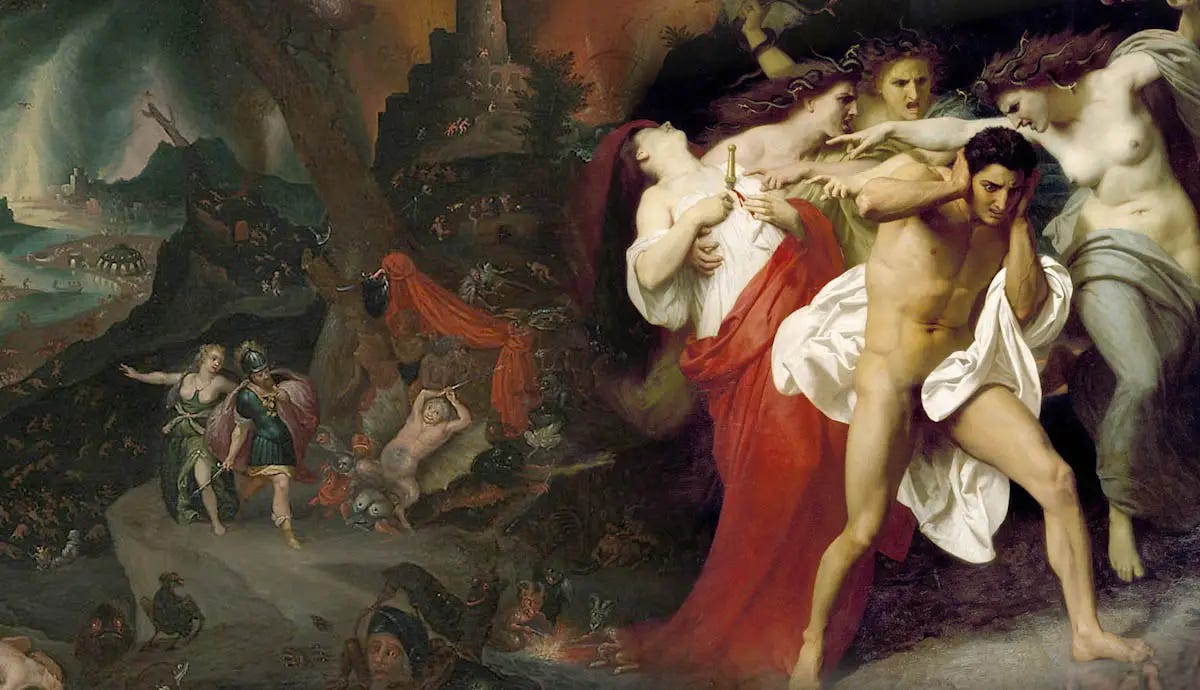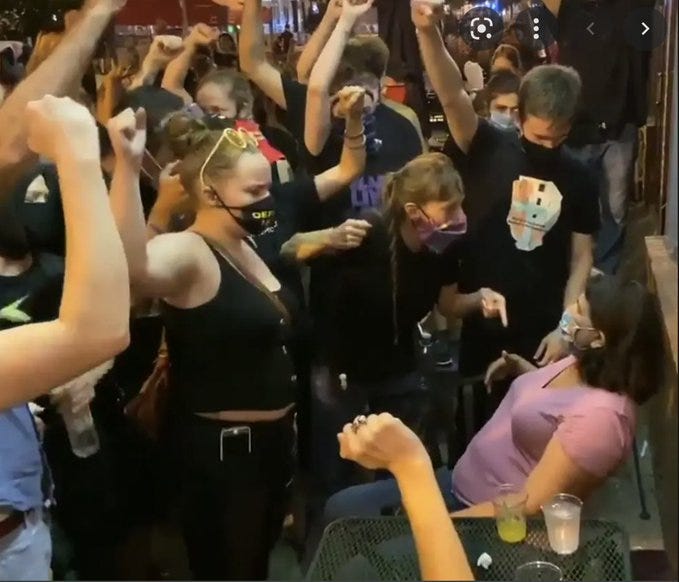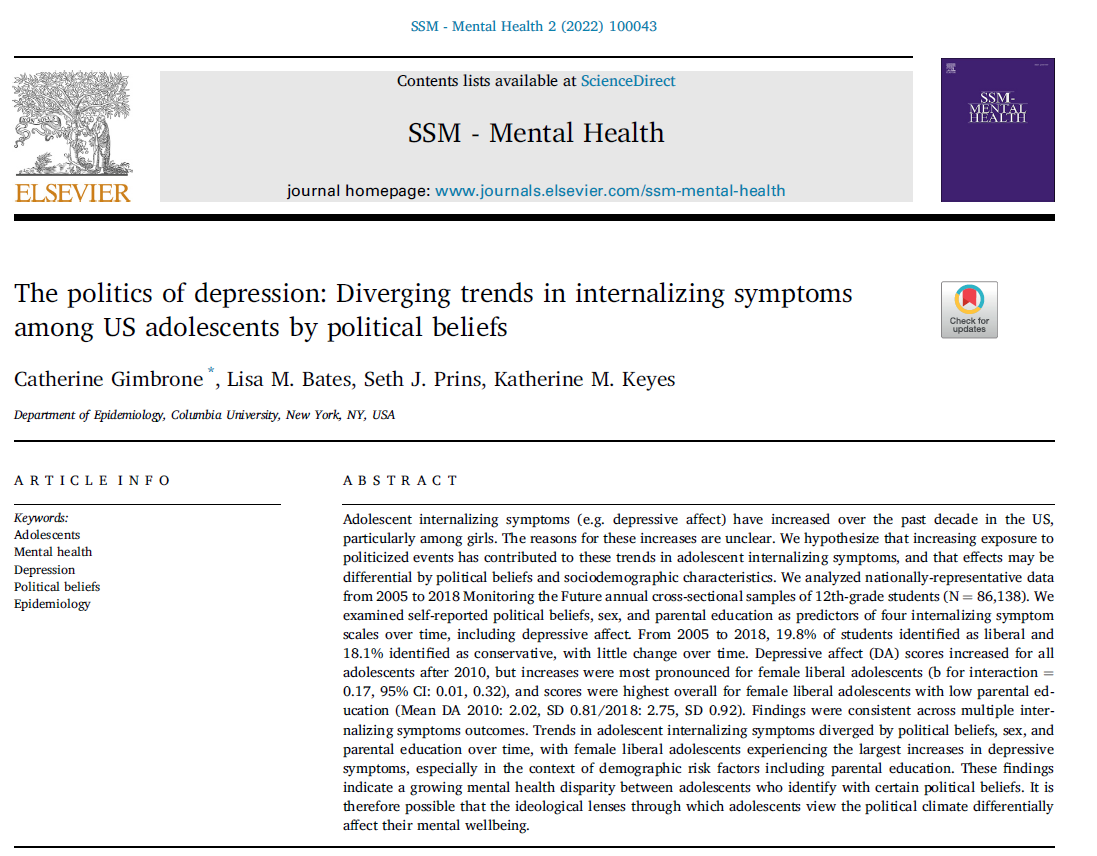On the Internalizing & Cluster B, Chthonian Crisis of the Current Moment
Algorithmic social media platforms are an incubator for performative histrionics & help fuel a pernicious cancel culture that hijacks the normative capacity to experience fear, anxiety, & guilt.
Chthonian (adj): concerning, belonging to, or inhabiting the underworld. “a chthonic deity”
Setting aside current ‘academic’ debate regarding the categorical or dimensional nature of common clinical and personality disorders and mental illness symptoms (and the mechanistic causal explanations for their manifestation), it is nonetheless possible to make a strong case that symptoms and signs associated with common clinical and personality disorders spanning internalizing and Cluster B personality disorders are disproportionately reflected in (radical) leftist activism and the political attitudes and beliefs associated with them.
Internalizing and affective mental illness symptomatology (e.g., elevated levels of depressive and anxiety symptoms and negative emotionality [NE]) is characteristic of mood and anxiety disorders and is one of the most prevalent psychiatric complaints throughout the lifespan. These mental illness symptoms also often present in conjunction with personality disorder psychopathology, including some elevated Cluster-B (narcissistic, borderline, histrionic) personality disorder symptoms.
Algorithmic scopic social media, especially TikTok, Twitter, and Instagram, where amplification of visual footage can reach viral transmission with remarkable celerity, is an especially efficient social portal or spread vector that selects for this behavioral signature of emotional lability and provocative affect—‘performative resistance art’—, which inherently serves to focus the viewer’s attention. One might view it as an incubator for personality psychopathology in a similar vein as how Jordan B. Peterson recently spoke about how the contemporary university milieu has contributed to a “fostered narcissism of the students…”. It also serves to gate a potentially unbridled cancel culture milieu where individuals are accused of unfounded moral or ethical transgressions and flash mobs emerge to target the accused before any rational examination of the accusations are undertaken. As Vinay Prasad and John Ioannidis have described, this phenomenon has increasingly emerged in academic discourse on Twitter, where scientists often punitively engage with one another and their academic work.
Below is a compilation of social media video clips and related media coverage that demonstrate with remarkable clarity the miasma of performative narcissism that saturate the current culture. It is instructive to note the interpersonal and affective behavioral similarities in each of these clips. Antagonism, scorn, narcissism, derision, histrionics, & a host of other personality psychopathology symptoms characterized by NE. Although one could certainly point to examples from individuals on the right (Trump’s performative grandiose narcissism comes to mind), it is quite reasonable to suggest this particular constellation of behaviors and personality traits—characterized more strongly by a virtuous, vulnerable narcissism—is much more prevalent in those associated with radical progressivist activism; in other words, the contemporary mainstream left where politicians in ‘big blue’ cities are increasingly “performative actors on behalf of the media.”
A recent example where performative, vulnerable narcissism and theatrics have been weaponized in the service of ideology occurred when senators Alexandria Oscasio-Cortez, and Ilhan Omar (two members of the original ‘Squad’) pretended to be handcuffed when escorted away from the Supreme Court where they were engaged in abortion rights protests with other House Democrats:
As Charles C. W. Cooke noted:
Another recent prototype exemplar: Law professor Khiara M. Bridges in discourse with Senator Josh Hawley. Particularly noteworthy is the antagonism in her replies to Hawley, escalating the emotional tenor of the discourse and attempting to draw Hawley into a combative frame “are you, are you, are you” (note the vocal tone & cadence takes on an escalatory manner).
Remember this example of the students at Arizona State University being asked to leave a multicultural space?
Arguably here we see performative narcissism from Ariel Atkins on the looting last summer in Chicago. Entitlement and narcissism likely share some common etiology.
And another from Chicago from last August h/t @John_Kass 'performance art.'
Here’s a prototypical ‘climate activist’ variant:
And here is another where a protestor interrupts the French Open semi-final for 10 minutes.
Continuing with this class of individuals, others have remarked:
Concerning the question of the rapid emergence of this striking association between behavior, personality, and political attitudes and beliefs, much has been written. For example, the recent report by Eric Kaufman described in this tweet thread is strikingly consistent with the above mini review of literature and social media discourse.
This very interesting niche paper “Tik Tok teens: Turbulent identities for turbulent times” offers some of the most provocative insights I have come across into the contributing role of social media in the emergence of this phenomenon.
I have offered my own view on the matter in a prior piece focusing on one city in particular, Pittsburgh, PA. This piece, penned by Martin Gurri, and recently featured on Wes Yang’s Substack Year Zero, illustrates with precision the visual elements depicted above in the context of “the psychopathology of the elite class”. Gurri draws out the quasi-religious elements of this psychopathology, which are eerily reminiscent of similar observations Chrisopher Lasch noted decades earlier “The Revolt of the Elites”:
Whatever the causal web of its origins are—perhaps a distinct cluster of behavioral and personality traits selected for by the unique reverberative framework of scopic social media—the crisis of the current cultural moment is qualitatively and quantitatively distinct. Its existence is undeniable. What remains to be seen is whether thought and political leaders emerge to shepherd us in navigating the Chthonian tempest else our nation does not continue to Balkanize and fractionate. In the words of Goldberg and Gurri writing in separate decades:
Cite as: https://doi.org/10.32388/substack.u28tjq • PDF












I spent a long time in progressive spaces. I have written before about the forces that shape this kind of activism. Disorganized thinking has derailed many activist projects. Alinsky's title, "Rules for Radicals," is aimed squarely at the instinct of so many ardent young idealists to shoot themselves in the foot. "The left" has no central nervous function or immune system that says "defund cops is political poison" to protect the whole. People with no larger responsibility than "owning the man" don't think about third and fourth-order consequences of the visuals they create or the demands they make. This is how radical groups like the Weathermen eroded the liberal alliance created in the 1950s by the end of the 1970s. Those of us who are old enough to remember Reagan being elected, and what America was like at the time, understand the consequences of this spiral.
Excellent as always.
One might aver that the difficult personal integration that mature spirituality entails is difficult to recapitulate at the merely atomic individual level, as if the average person might suddenly discover within them the stoic truths of Marcus Aurelius... This of course rarely happens, though the human longing may be there for greatness more widely than cynics think.
There is an inborn grandiosity in us each which it is the task of adolescence and then adulthood to progressively overcome. The on-campus Marxist fusion of "the social is political" has inflated students right when they should be running into structures that might discipline their impulses and chthonian chaos. This is a deeply pernicious form of intellectual abuse.
A university that reviles both itself and the West -- having been inseminated deeply by the life-hating Marxist strain now predominating -- teaches students to explicitly reject structure in society per se and meaning in life per se, which is a dangerous cocktail of the purest nihilism.
This is what Paglia meant by "Happy are those times when religion is strong." The great challenge is how do we reintroduce a sense of the sacred and transcendent now that organized religion is gone? Most will not become philosopher kings...
While these are the deeper, grander questions, the immediate question of getting control of our governance and wresting control from the hard left is now preeminent.
The public is going to have to rapidly regain respect for law and order, disciplining wayward students (both in primary school and college), curtailing gender experiments with children, and a sort of awkward but just-doable painful discussion about how racial consciousness of a healthy sort does not entail the toxin now being poured down the throats of students of every color, but a different and more sophisticated rapprochement with an imperfect past must instead be made.